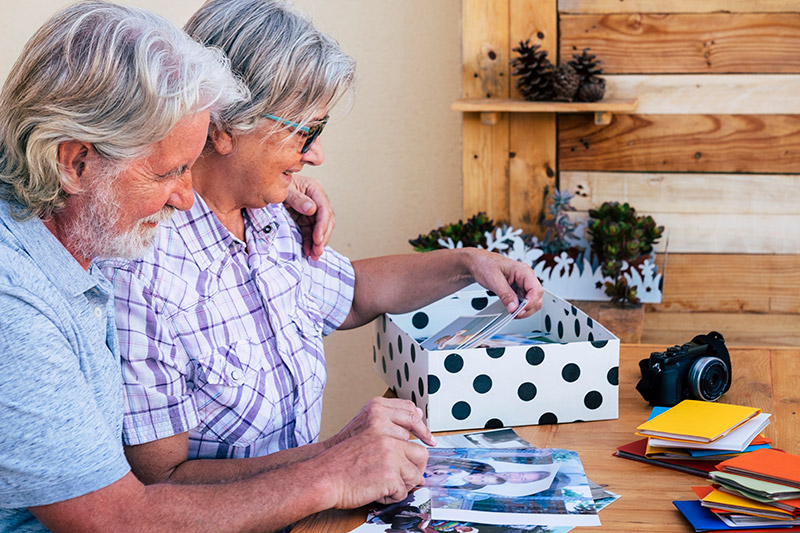How to Create a Memory Box for Seniors with Dementia
Memory boxes can stimulate reminiscence, provide comfort, and enhance connections between seniors and their caregivers or family members. If you’re looking for tips to create a memory box for your senior loved one, you’re in the right place. Here, we’ll explore why memory boxes work, what items you should include, and how to use one effectively.
How memory boxes help seniors with dementia
A memory box can play a vital role in the care of someone with dementia by anchoring them to their identity and history. It stimulates conversations and can often lead to moments of happiness and recognition, which are invaluable for someone whose memory may be fading.
Not only do these boxes help seniors recall their past, but they also provide caregivers, family members, and friends with insights into the senior’s life, fostering empathy and a deeper understanding.
What to put in a memory box
The effectiveness of a memory box hinges on the items it contains. Each item should have personal significance and connect to a memory or emotion. You can include things like:
- Photographs: Collect photos that capture important events, people, places, and even pets throughout your loved one’s life. Label each photo with names, dates, and locations to help prompt memories and discussions.
- Personal Items: Items like a favorite piece of jewelry, a cherished book, or a gift from a loved one can be powerful triggers. If they have any mementos related to past hobbies or careers, such as medals, badges, or handmade items, these can also be useful.
- Scented Items: Scents can be incredibly effective at evoking memories So consider adding items like a favorite perfume (theirs or a loved one’s), a dried bundle of their favorite flowers, a candle that smells like a favorite dessert, or a familiar object with a distinctive smell, such as an old baseball glove.
- Music and Sounds: A mix CD or a USB drive with favorite songs, music from significant eras, or sounds like those from a memorable place or events can also stimulate memories. Music is often retained even when other memories fade.
- Letters and Documents: You can include copies of meaningful letters, journal entries, marriage certificates, or diplomas as well. These documents may bring back memories of significant life achievements or relationships.
How to use a memory box effectively
To make the most of the memory box, it’s important to use it the right way. So you’ll want to:
- Make It a Routine: Regularly pull out the memory box with your loved one during a quiet, comfortable time of day when you can sit together and go through the items one by one.
- Encourage Storytelling: Each item can prompt a story, so ask open-ended questions about the items, like “Tell me about this photo,” or “What does this smell remind you of?” This can help stimulate conversation and give your loved one a thread to follow to recall the associated memories.
- Observe the Reactions: Pay close attention to how your loved one reacts to different items. Some might bring happiness, while others could evoke sadness. Recalling sad or bittersweet memories isn’t necessarily bad, but you should remove any items that cause distress or confusion.
- Keep It Updated: If you discover new items that spark memories, add them to the box. Likewise, if your loved one doesn’t seem to connect with a particular item, remove it or replace it with something else.
Enhancing seniors’ quality of life
A memory box is more than just a collection of items — it’s a tangible link to your loved one’s life history, and it can provide comfort and connection as they face the challenges of dementia. Familiar, meaningful items from your loved one’s past can spark conversation and reminiscence and help them recall memories that are slipping away, improving their mental and emotional health and quality of life.
At Right Hand Senior Care, we’re dedicated to preserving seniors’ comfort and quality of life even through the struggles of Alzheimer’s or dementia. Our compassionate, professional in-home caregivers understand how to work with seniors who have cognitive challenges, and they work hard to build genuine, trusting relationships.
If you’re looking for affordable, reliable at-home care for your loved one, contact us today. We’ll get to know your loved one and create a personalized care plan designed to meet your family’s needs.

We are Superheroes in Comfortable Clothes™
We take care of our clients, their families, our staff, and our league of franchise owners.

